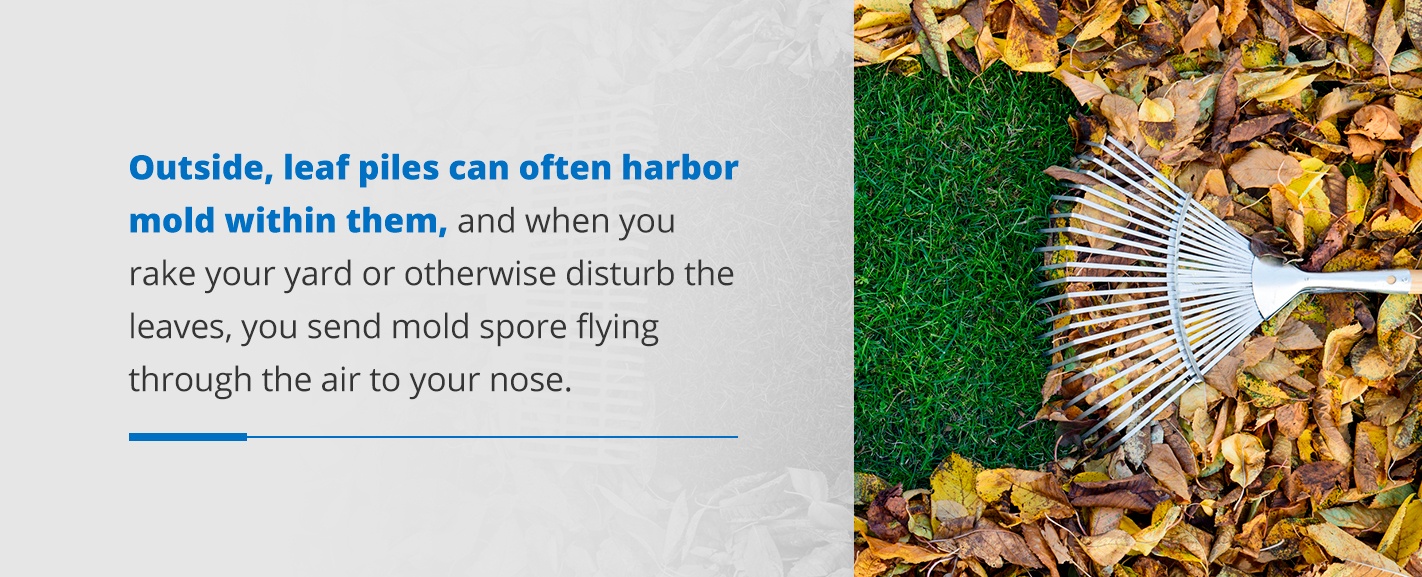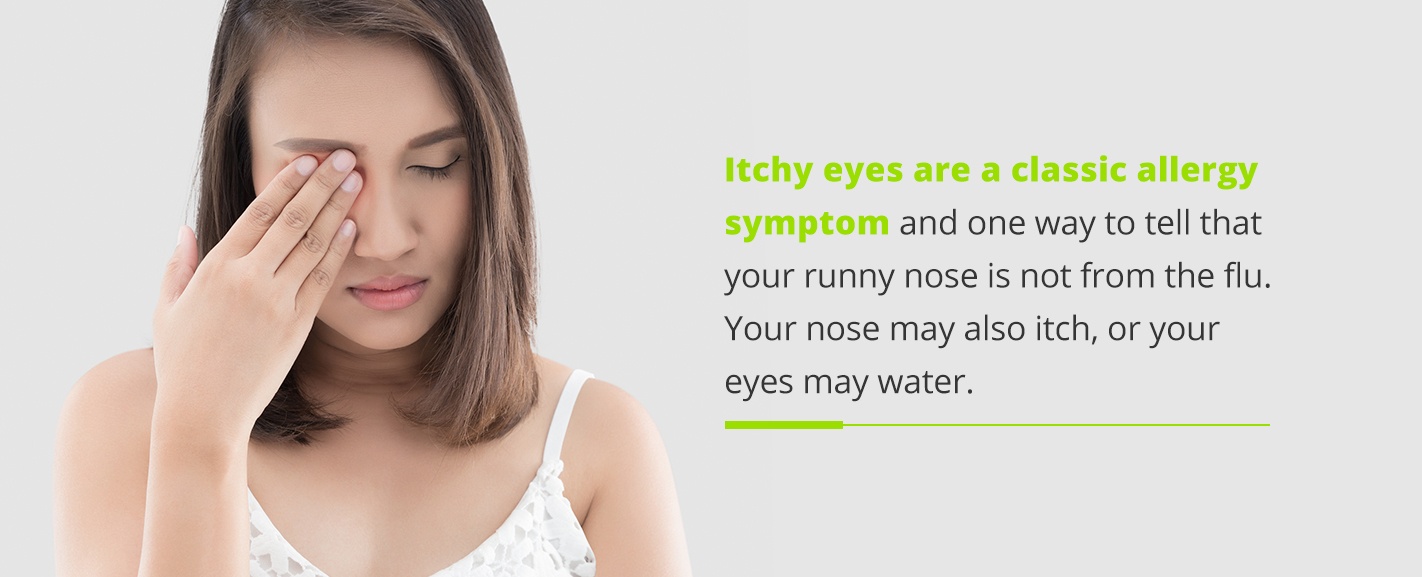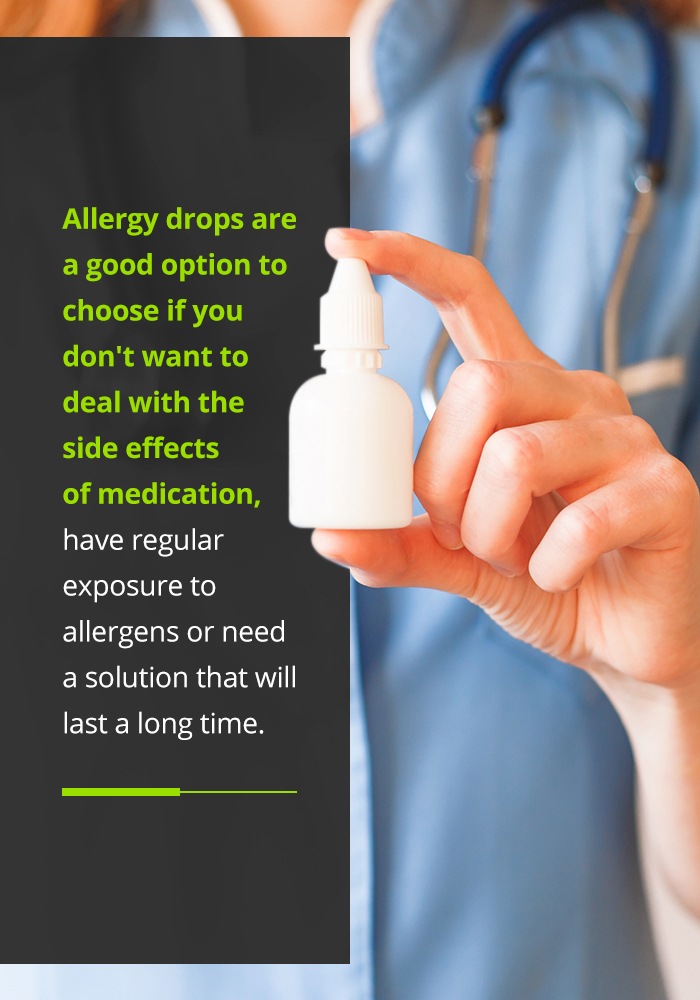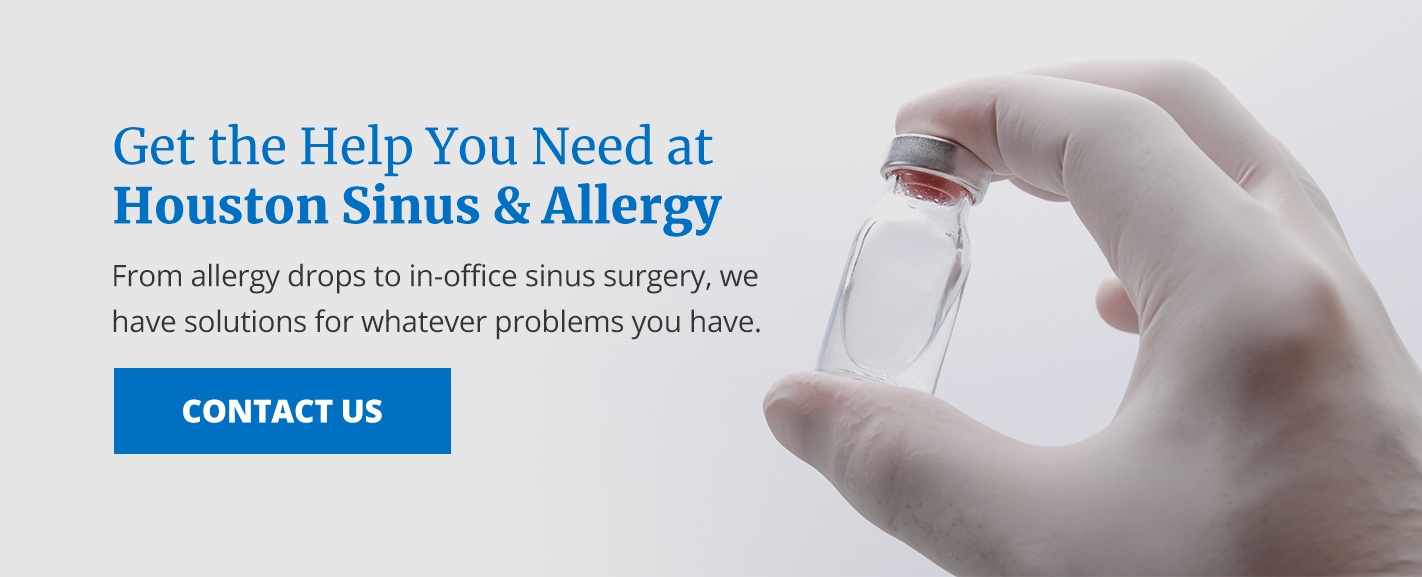
While some people only experience allergy symptoms during the spring, another wave of sneezing and itching can hit during the fall. Some unfortunate allergy sufferers experience symptoms during both seasons. In Houston, the long growing season and warm weather mean allergy season can last months longer than in other parts of the country that experience early frosts in the fall and late freezes in the spring.
If you think you have fall allergies, use this guide to identify your symptoms and learn how you can finally get relief.
What Are the Causes of Autumn Allergies?
Fall seasonal allergies occur around the time kids return to school at the end of summer. The weather cools, and the leaves on the trees drop. The changing weather also brings exposure to allergens you may not encounter during the rest of the year.
Ragweed, dust mites and mold can all cause allergy symptoms starting in mid-August. In years with wet, warm summers, the fall allergy symptoms can be especially bad due to a proliferation of plants that cause these problems.
Ragweed
Ragweed poses a serious problem for people with seasonal allergies. Those who suffer from ragweed allergies in the spring usually suffer in the fall as well.
Ragweed pollen begins to release when nights cool off and days stay warm. The biggest problem for those suffering from allergic rhinitis, or hay fever, from ragweed is their symptoms typically don’t abate until the first freeze of the season kills the plants. In Houston, this may not happen until deep into the winter, prolonging the sneezing season for those with fall allergies to ragweed and other pollens.
A single ragweed plant can release a billion grains of pollen, and these hearty plants can create problems for sufferers for six to 10 weeks, on average.
Mold

Warm, moist areas can grow mold, both indoors and out. Outside, leaf piles can often harbor mold within them, and when you rake your yard or otherwise disturb the leaves, you send mold spore flying through the air to your nose. Cool fronts that bring drier air and high winds in the fall can also blow mold spores into your nasal passages and eyes.
Even if you prefer to spend the cooler fall months indoors, you can still experience fall mold allergies from mold growth inside your bathroom or garage. High humidity frequently leads to mold growth. With Houston’s humid summers and high heat, the warm, damp conditions that mold grows in could happen in outdoor sheds or unattached garages. Therefore, interior mold spores can still cause allergy issues for those who rarely go outside.
If you have a water leak in your home, you’ll need to repair the leak and replace any water-damaged materials. If you don’t, you may experience sneezing, watery eyes and other symptoms of an allergic reaction to mold in your home.
Dust Mites
Contrary to what some think, dust mites are not dust. They are microscopic organisms that live in the dust around your home.
Dust mites can arise from a number of things, from turning on your home’s heating system to going back to classrooms that have remained empty and collected dust over the summer.
The conditions that dust mites most often grow in — warm weather and high humidity — proliferate throughout the summer and fall months in Houston. It’s not a coincidence that these same conditions are those preferred by mold spores. They tend to accumulate in upholstered furniture, carpet, drapes, bedding and stuffed animals.
While you will often encounter dust mites inside, keeping your home clean and using dust mite-proof covers can reduce the amount of contact you have with them.
Fall Allergy Symptoms
Autumn allergy symptoms tend to overlap, regardless of the cause. In many cases, you will come to associate these symptoms with exposure to your allergen. Identifying your symptoms is important, especially when you start to seek fall allergy remedies to alleviate your suffering. Some of the most common symptoms are:
Runny Nose or Post-Nasal Drip
Both a runny nose and post-nasal drip occur when your nose creates too much mucus. The secretions that flow down the back of your nose to your throat are called post-nasal drip.
These conditions can happen from allergic reactions, but they may also be signs of a cold or flu. The post-nasal drip could also cause coughing, hoarseness or a scratchy throat.
To reduce the effects of a runny nose or post-nasal drip, you will want to find remedies that prevent your body from reacting to the allergens. Newer antihistamines that last all day produce less drowsiness than older varieties. However, all types of antihistamines can cause dry mouth, drowsiness or make the nasal mucus too thick. Drinking extra water can prevent some of these problems.
Itchy, Swollen Eyes

Itchy eyes are a classic allergy symptom and one way to tell that your runny nose is not from the flu. Your nose may also itch, or your eyes may water. These are normal symptoms of fall eye allergies.
Depending on how bad your symptoms are, you may have trouble seeing through your eyes from excessive watering. Antihistamines can help itchy, swollen or watery eyes. You can take them in pill form if you have allergy symptoms in your nose that you also want to ease. Allergy eye drops with antihistamine treat only your eyes if that is the only place you experience watering or itchiness. Talk to your allergist or an optometrist if you have questions about the best treatment for your watery eyes.
Coughing
The cause of coughing starts from allergens you breathe in. Inhaled allergens can cause a runny nose and post-nasal drip. Coughing may occur from post-nasal drip, causing a tickling or dryness in the back of your throat. Wheezing or difficulty breathing caused by allergies may also make you feel like coughing.
Inflammation
In some allergy sufferers, inflammation accompanies their symptoms. The swelling is the body’s natural reaction to an increase in histamine levels. It can cause pain and pressure in the head. Swelling in the nasal passages may make breathing through the nose difficult.
To alleviate the inflammation, find ways to keep the body from overproducing histamine by avoiding the allergens. Take antihistamines to block the body’s reaction to them or choose medicines that reduce inflammation to make breathing easier.
Sneezing and Congestion
Sneezing commonly accompanies other fall allergic reactions. The itching in your nose may prompt regular sneezing during the fall.
If you have too much mucus in your nose to clear it or inflammation that keeps it from dripping out, you may also have nasal congestion. Antihistamines do not allow you to breathe easier, but decongestants can reduce your nasal swelling, allowing mucus to flow freely and ease your breathing.
Fall Allergy Remedies
When it comes to remedies, talk to your allergist about the best options for your condition. If you only experience mild reactions, staying away from the allergen may help. For regular exposure to dust mites or mold spores that you cannot eliminate from your life, you may need to talk to an allergist about immunotherapy for a long-term solution. Some common fall allergy remedies include:
Antihistamines
When it comes to allergy medicine, antihistamines should be at the top of your list of over-the-counter remedies. These medications work by blocking the histamines the body produces, stopping the allergy symptoms before they start.
Because these medicines work to prevent your body from having a reaction to allergens, you should take them daily or when you know that you will expose yourself to the things that make you sneeze. You can take antihistamines when you experience symptoms, but you will have to wait for the medicine to start working before you get relief. Taking antihistamines daily or as a preventative measure can keep you from experiencing the symptoms of allergies before they happen.
Talk to your doctor if you take antihistamines for allergy symptoms and do not see relief or your symptoms get worse. You may have another condition that requires different treatment.
Immunotherapy
Immunotherapy used to mean going to an allergist for regular allergy shots. Luckily, you don’t have to visit a doctor for weekly allergy shots anymore. Now, you have the option of getting easy-to-take allergy drops that your doctor prescribes to you.
Allergy drops are a concentrated form of the ingredients once used in allergy shots. You put a few drops under your tongue to help your body to get accustomed to the allergen. When your body no longer views the allergen as a threat, its immune response is not as dramatic as the one that once caused your allergy symptoms.

Allergy drops are a good option to choose if you don’t want to deal with the side effects of medication, have regular exposure to allergens or need a solution that will last a long time.
Reducing Allergen Exposure
Making efforts to reduce your allergen exposure is often a good first step to take. For example, if you have an allergy to ragweed, stay inside when ragweed pollen levels are high. Most weather forecasts will include allergen levels for the day. Keep your windows closed to keep the pollen outside.
Use a HEPA filter in your air conditioner or central heater to capture pollen before it gets to you. If you have to go outside, change your clothes and take a shower as soon as you return home to wash any pollen off your body.
For dust mites, reducing your exposure means using dust mite-proof covers on your bed and furnishings. These covers seal the dust mites into the bed, so you don’t inhale them during your sleep. Putting tape over the zippers on the covers adds another layer of protection. Wash your bedding in hot water and vacuum the bed a few times a year to remove dust mites.
Keeping mold spores at bay requires you to ensure your home stays dry and clean throughout the year. Clean up water leaks immediately. If water drips through a wall, you will need to replace the portion of the damaged wall and the surrounding area to remove any hidden mold. The same holds true if your home floods. Mold from even a small amount of water can cause serious allergy symptoms in those allergic to it.
Sinus Surgery
Allergists do more than offer allergy drops. They can also provide you with long-term solutions in the form of stronger medications and surgery. Sinus surgery no longer requires you to go to a hospital for the procedure. At Houston Sinus & Allergy, we regularly do in-office sinus surgery, so you get fast results.
Balloon sinuplasty helps ease the problem of chronically inflamed nasal passages. If you live with frequent sinusitis and have trouble breathing through your nose, despite other treatments, talk to your doctor about surgery.
During this procedure, the doctor inserts a balloon into your sinuses and blows it up. This reshapes the nasal cavity, making it instantly easier to breathe. Full recovery from the surgery only takes a day or two, and you will no longer need nasal medications to breathe through your nose.
Sinus Rinse
Similar to avoiding exposure is to clean out the allergens from your sinuses after exposure with a neti pot. Using an over-the-counter pot, you pour a mixture of salt and distilled water into one nostril while you lean over a sink. The water flows through your nostril, into your sinuses and out the other nostril, taking with it dust and pollen you inhaled during the day.
Nasal Sprays and Decongestants
If you experience congestion from fall allergies, you can try over-the-counter nasal sprays or decongestants. Some nasal sprays work only for a day or two before causing rebound congestion, while other sprays are corticosteroids, used for longer-term inflammation reduction.
Decongestants in pill form help reduce inflammation like nasal sprays, but these do not cause rebound congestion. The downside to over-the-counter decongestant pills is you might feel jittery while taking them, which is why those with high blood pressure, glaucoma, heart disease and similar conditions should take these pills only under a doctor’s supervision. Nasal decongestants do not cause these issues.
Get the Help You Need at Houston Sinus & Allergy
Don’t suffer from fall season allergies alone. You can get help beyond over-the-counter remedies.
Whether you live in Houston, Cypress or Jersey Village, we can help you to breathe freer during the fall and throughout the year. From allergy drops to in-office sinus surgery, we have solutions for whatever problems you have.
If you want relief from your fall allergy symptoms, contact Houston Sinus & Allergy to book an assessment.

